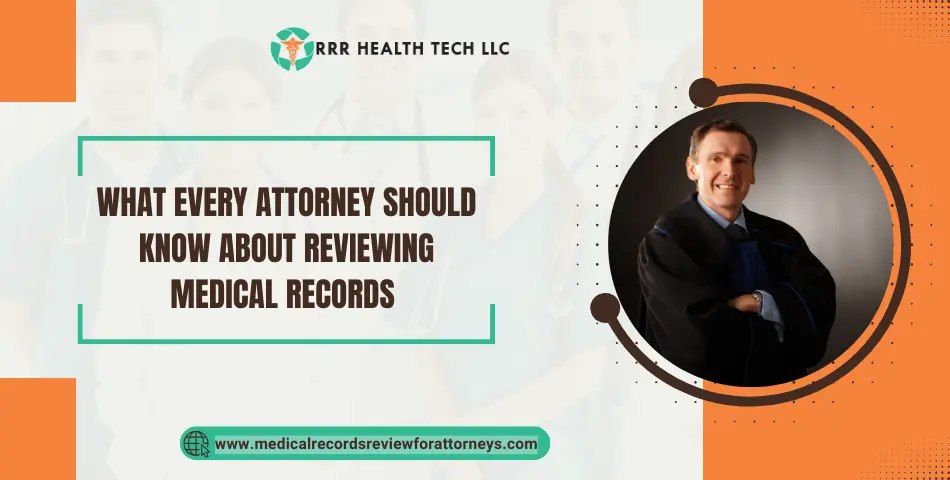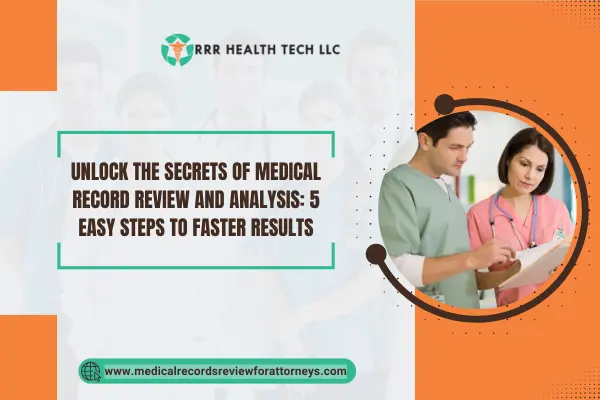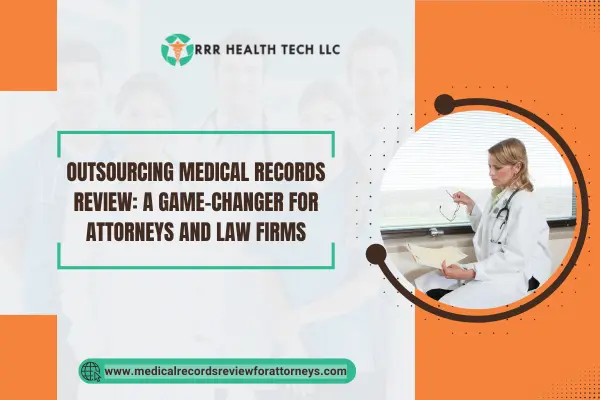
Introduction
Building strong legal cases requires attorneys to master the Reviewing Medical Records. These records are needed to evaluate evidence, spot contradictions, and create persuasive arguments. Nevertheless, the immense amount of documentation involved, and complexities of medical terminology make it difficult.
To overcome these hurdles in question, attorneys must possess exceptional attention to detail and specialized knowledge. Accuracy in interpreting medical records often decides the destiny of a case.
1. Efficiently Obtaining and Organizing, Reviewing Medical Records
The case review process needs all relevant medical records to be obtained since this assist in building a robust legal position. Without exhaustive documentation, some crucial aspects might be missed thereby weakening the attorney’s position.
For easier accomplishment of this goal, specific strategies for efficient requests as well as collection of medical records should be observed. They entail:
- Checklist Creation: Listing out all probable sources of medical records pertinent to the case.
- Employing Standardized Request Forms: Using standardized forms speeds up requests from providers’ side.
- Carrying out effective follow-up measures that guarantee timely receipt of documents.
To read more about these strategies extensively on Strategies for Efficiently Requesting and Gathering Medical Records that was published by the National Library of Medicine.
2. Mastering Medical Terminology and Documentation
It is important to be able to understand complicated medical terms to accurately interpret medical records. Key facts may be misunderstood or missed if the meaning of such terminologies is not well understood.
Effective analysis of physician notes can offer valuable insights into a patient’s condition and treatment history. Concentrate on figuring out what can be inferred from doctors’ handwriting and abbreviations so you can discover some significant health events.
Because these might have great legal significance, it is necessary to identify key details in the treatment plans. Detect deviations from standard care protocols or any abnormal changes in therapy strategies that could influence the casuistic denouement.
3. Creating a Strong Case Chronology Through In-Depth Reviewing Medical Records
It is necessary to have a robust chronological timeline that leans on medical evidence backed up by the advocate’s points. This will enable you to put the sequence of events in an orderly, convincing manner that supports your client’s case.
Key steps for an effective Reviewing Medical Records:
- Record all parts of your review.
- Collate and record any dates and incidents of interest.
- Compare details against each other for correctness.
A comprehensive timeline ensures that nothing is left out thereby aiding in creating a cohesive narrative that supports your client’s case.
4. Collaborating Effectively with Medical Experts in Reviewing Medical Records
The importance of medical experts in giving professional opinions and testifying cannot be underestimated since they play a vital role in building strong legal cases. They can help demystify complex medical issues to aid in understanding of patient’s conditions and treatment.
Here are some tips for collaborating effectively with medical experts:
- Identify The Ideal Specialist: Select consultants whose proficiency matches closely the specifics of your case.
- Set up clear communication: Have consistent, open, and clear communication with the consultant to ensure that both sides have a common understanding of what the case demands.
- Give comprehensive case details: Share all relevant medical records and case information with the expert to facilitate a thorough analysis.
- Prepare for testimony: Work closely with the expert to develop compelling and easily comprehensible testimony for court presentations.
5. Ensuring Privacy, Confidentiality, and Legal Compliance in Reviewing Medical Records
During the process of reviewing medical records, strict compliance with privacy regulations and confidential handling of sensitive information should be always maintained. This is because confidentiality must be observed so as not to infringe on clients’ rights while adhering to legal mandates.
To ensure compliance with HIPAA guidelines, attorneys should:
- Employ secure means for exchanging electronic health records (EHR).
- Use encryption tools when transferring or storing data.
- Educate staff regularly on HIPAA requirements and data protection practices.
- Conduct routine reviews aimed at identifying potential security vulnerabilities within an organization.
Following these rules will enable lawyers to effectively manage health records without violation of privacy concerns or any legal obligations.
To overcome complexities, try our medical record review solutions for your cases
Conclusion
Using the strategies and best practices discussed, lawyers can navigate the complexities of reviewing medical records. Professional medical record review services are essential in improving case outcomes and maximizing settlements for clients. When such methods are applied, it guarantees a comprehensive and effective review process that is useful in legal cases.
FAQs (Frequently Asked Questions)
What is the importance of medical record review for attorneys and its impact on legal cases?
Medical record review is critical to attorneys as it provides essential evidence and insights into a patient’s condition and treatment history which has a significant impact on the outcome of legal cases.
What are the key challenges faced by attorneys when dealing with complex medical records?
In reviewing processes, lawyers often encounter problems like acquiring all relevant medical records, grasping complex medical terminologies, constructing strong chronologies of cases, working collaboratively with medical professionals as well as ensuring privacy rights, confidentiality, and legal compliance.
Why is it important for attorneys to understand complex medical terminology in the context of reviewing medical records?
Without understanding complicated medical terms, attorneys cannot make sense of the passages or find important facts that may have legal implications for their case.


